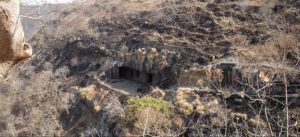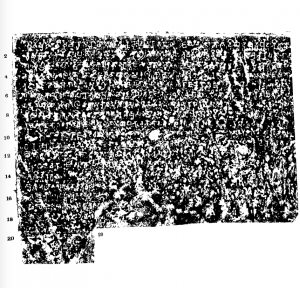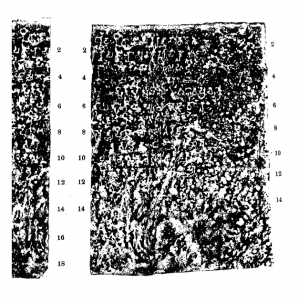


This stone inscription is carved onto the back wall of the veranda of the Ghaṭokaca cave at Gulwāḍā, which is a Buddhist site. The inscription, like those found at Ajaṇṭā, has been damaged by the weather, originally being 22 lines long, but now the last four lines are almost completely worn away. According to Shastri (1997: 44-45), the inscription was incised to record the excavation of the cave in which it is recorded and its donation to a Buddhist saṅgha, although the damage to the inscription over time has led to the details of the donation remaining unknown. The beginning of the inscription includes praise of the Buddha and a family history of Varāhadevā, a minister of the Vākāṭaka king, Hariṣeṇa.
(Verse 1) Victorious is he who is called the Buddha, the sage among sages, the teacher among teachers, the immortal among immortals, the best among the eminent (and) a store of marvels―who attained enlightenment by abstension from the enjoyment (of worldly pleasures)
(V 2) (Victorious) next (is) the law promulgated by him who knows the law, and (victorious) also (is) the Community, the best among all communities, having done service to which, a worthy recipient, the sons (of men) become exalted
(V. 3) In the southern country is well known a great race of most eminent Brâhmanas named Vallûras, which (race) has accumulated religious merit and glory since (the age of) Brahmâ and is honoured by the great
(V. 4) In that (race) was born famous Yajña[pati], an excellent Brâhmana, who resembled the primeval Brâhmanas Bhrigu, Atri, Garga and Angiras, notes for then good qualities
(V 5) His son was Dêva, who being wise, learned, proficient in political wisdom and engaged in the performance of religious rites, resembled the god (Krishna), being guided by whom, the whole kingdom together with the king performed religious duties even as Pârtha (i e, Arjuna) did (under the guidance of Krishna)
(V 6) From him was born Sôma, a second moon as it were, who, performing religious duties as enjoined by the Vêdas and Smritis, gave his love (equally) to wives of the two (castes), born in Brâhmana and Kshatriya families
(V 7) On a Ksatriya wife of noble birth and character, he begot a good-looking son named Ravi, possessed of marks of royalty who established his sway over the whole territory
(V 8) From other Brâhmana wives he obtained sons who fulfilled their desires in mastering the Vêdas,―whose habitation named Vallûra is even now (well-known) in the southern country
(V 9) The son of Ravi was Pravara. From him sprang Śrî-Râma. His son was Kîrti of good repute, and from him was born Hastibhôja.
(V 10) When the Vâkâtaka Dêvasêṇa was ruling, Hastibhôja distinguished himself by his excellences―(he) whose noble birth (and) charity …….. even now
(V 11) Among the resolute, intelligent, efficient and meritorious colleagues…… when the king’s
(V 12) Occupying a half of whose seat ……… men ………. in the assembly ………
(V 13) Then there is Harishêṇa, the son of Dêvarâja ………… Hastibhôja ……….
(V 14) Observing (his) fame as white as moon-beams.
(V 15) Then was born (to Hastibhôja) a dear son, who was his (very) self, possessed of a hundred qualities
(V 16) Among his many sons
(V 17) ………. the entire reward
(V 18) Here is Varâhadêva, thoroughly examined